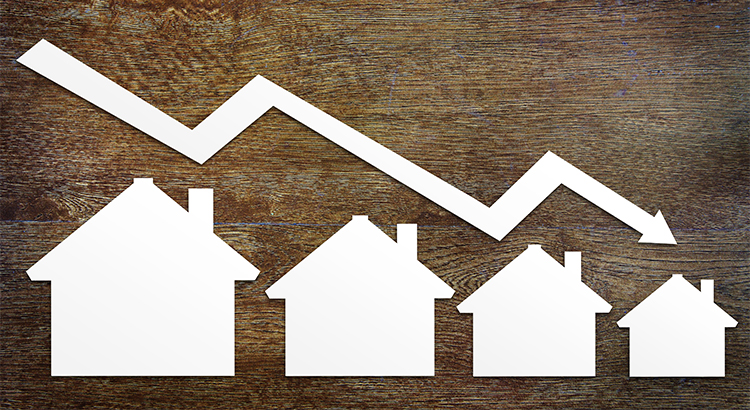What a Lack of Stock Actually Means for Homeowners
As is the case with all markets, the property world is also driven by supply and demand. When the demand for available properties is higher than the amount of homes available for purchase, the prices being asked for homes tends to be a little higher, while supply that exceeds demand will lead to house prices being a little lower. Just as with stocks, bonds and products and services, this basic economic principle is what guides and drives the market.
Various factors may have an influence on supply and demand in the property market. For example, lower interest rates will put buyers in a better state of mind about incurring debt. Historically low interest rates have, without a doubt, driven buyer demand in Australia, with the local housing market proving exceptionally resilient despite the outbreak of the novel coronavirus and the ensuing economic fallout as a result of national lockdowns.
An increase in interested buyers drives up the demand for property, and if supply doesn’t keep up, this could lead to a lower inventory of available properties. This will have homeowners that are currently planning to put their property on the market excited, and expecting great returns when their house does eventually sell.
What a home will ultimately sell for is not only dependent on supply and demand, though. The real estate agent helping homeowners to sell their property will advise them that it is necessary to conduct a comparative market analysis on their property. This essential tool in the real estate agent’s arsenal will help them to determine an asking price that is realistic and fair, but also guarantees that the seller makes a good profit. To do the CMA, a real estate agent takes into account all the features and amenities of the property, the overall state of the home, as well as comparing these to similar properties in the same city or suburb.
The CMA ensures that homeowners don’t price themselves out of the market – a common occurrence that often leaves homeowners disappointed, and their property lingering on the market and becoming stale. Trusting your real estate agent to determine the correct asking price is one of the greatest perks of using the services provided by a real estate agent. Considering the fact that real estate agents also help sellers with a variety of other aspects related to the sale of their property – like taking care of the extensive admin involved in selling a home, for example – choosing to sell with a real estate agent by their side is one of the best decisions prospective home sellers can make.
How Low Inventory affects the Housing Market
It goes without saying that a low supply or housing inventory will inevitably have an influence on the property market in general, often leading to greater competition among prospective buyers to snap up the best properties at the best possible price. In this scenario, home sellers have the negotiating power as buyers vie over their property, and there is certainly the possibility of taking advantage of higher-than-average home prices and reaping a handsome profit after the sale of the home has gone through.
Low inventory, therefore, will affect the housing market significantly in the sense that it will drive up demand among buyers. As the cold weather starts lifting and spring arrives, demand for property is sure to increase even further, as is traditionally the case. If this happens again in 2021, demand may further exceed supply, possibly even pushing property prices a little higher still, depending on the specific city or suburb that homeowners are selling in.
Prices and Property Sales
As mentioned earlier, the price a home ultimately fetches on the market is also influenced by the prices that similar properties in the same city or suburb are selling at at any given time. These are, in turn, influenced by the greater economic climate, interest rates, and a host of other factors that may tip the property market one way or another.
In this regard, it is important to note that the property market is notoriously difficult to predict. As laymen who do not have extensive knowledge of the market, homeowners should be wary to base a decision to sell (and to sell at a specific price) on their own knowledge of the market, or of their perception of it. While many sellers think they will be able to manage the sale of their own home, they often don’t realise exactly what needs to be done, and don’t have access to extensive information of the property market, and don’t have current buyer trends at their fingertips.
For this reason, it is always advisable to consider enlisting the services of an experienced, trained, accredited and knowledgeable real estate agent. These moguls of real estate will come equipped with everything sellers need to make a good sale on their home. Because real estate agents navigate the world of property every day, they have extensive knowledge of the property market at large, and of the ebbs and tides of the local real estate realm. This means that they also likely have access to a ready-made database of potential buyers, who may just be looking for a home exactly like the one homeowners are planning to sell.
Real estate agents know how to estimate a selling price that will appeal to the broadest possible group of buyers, and know how to set a price that will ensure a sale.
Financial Support
In March 2020, all of Australia’s big four banks offered Australian homeowners a six-month mortgage deferral to make up for any financial consequences they may have suffered due to the national lockdown last year. While those six months have come and gone, the latest lockdowns in parts of Australia have led banks to again offer their clients tow to three months’ deferral on their mortgage payments, while Australia’s biggest home lender, the Commonwealth Bank, has announced that it would have a moratorium on evictions until February 2022.
This added financial support to homeowners means that the property market will not be flooded with homes due to owners being forced to sell their houses, which means that the high demand for property looks to remain, at least for the foreseeable future.
Supply and Demand in Housing
Higher demand should ultimately lead to greater returns for home sellers, but this is not always the case. The area in which the home is being sold will have a huge influence on whether a property sells and how much it sells for.
While demand is always high in metropolitan areas where economic opportunities are plenty, more rural areas may not see the same interest, which means that houses which are being sold may spend a much longer time on the market, if they even sell at all. Sellers shouldn’t be guided by what is going on in the Sydney property market, for example, as the property market in smaller towns will not even be remotely comparable.
Again, real estate agents are sellers’ best partners in this regard, as they keenly understand the undercurrents of their own area, and know how to use these to the advantage of sellers.
Upgrading in a hot market
When considering supply and demand, it is easy to forget that there is generally always movement in the property market anyway. There will always be young professionals that are looking to relocate for work, and there will always be growing families that want to upgrade their home to make space for additional family members.
When demand for homes is high, sellers should seek to take advantage of the movement in the market, but just because demand is high, it isn’t automatically a sign that homeowners who have been sitting on the fence about selling their property should suddenly jump into a sale that has not been well thought through.
Speaking to a trustworthy, qualified and experienced real estate agent will help sellers to make a decision that suits their circumstances and their selling goals, ensuring that they don’t just sell because it is ostensibly a good time to do so.
Conclusion
Supply and demand drive sales – and this is as true in the property market as it is in any other industry. A guiding economic principle, supply and demand has an influence not only on which homes sell, but also on the price they are bought for.
When demand exceeds supply, home sellers often get very excited about the huge profits they are going to make when the many interested buyers start knocking. Even so, supply and demand are not the only forces governing what homes will sell for.
A comparative market analysis, done by an experienced real estate agent that thoroughly understands the market they are operating in, will be a far more valuable compass as to how to price a home.
Do you find it difficult to understand all the factors associated with the sale of your home, and need some guidance about selling? Perfect Agent’s wide range of real estate experts are ready to attend to all your selling needs.




